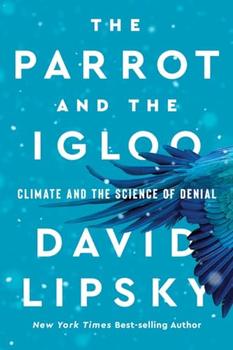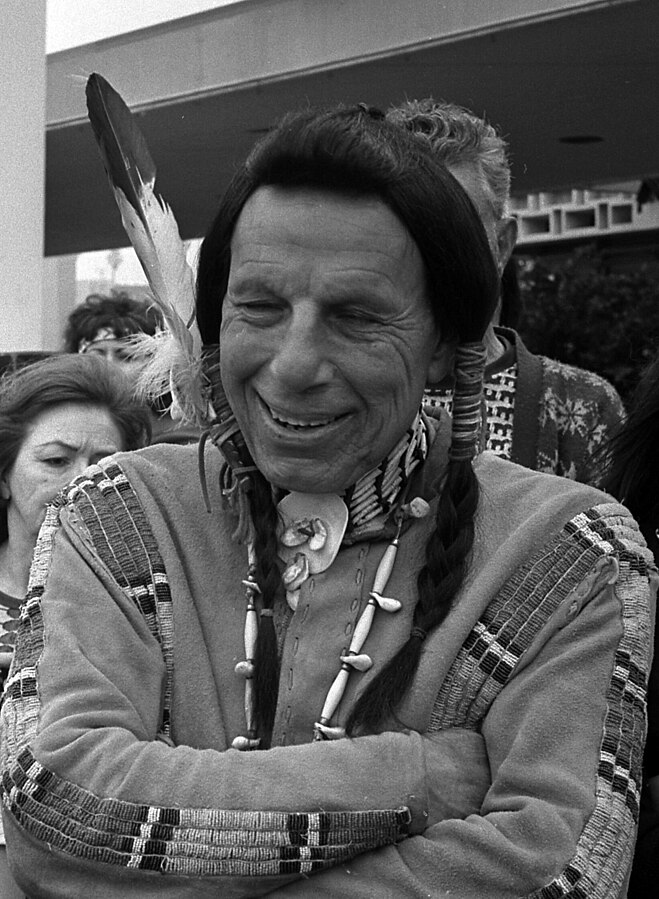Summary | Excerpt | Reviews | Beyond the Book | Read-Alikes | Genres & Themes | Author Bio

Climate and the Science of Denial
by David LipskyThis article relates to The Parrot and the Igloo
 David Lipsky's history of climate change denial, The Parrot and the Igloo, exposes many of the strategies deniers have used to prevent governmental action on environmental issues. One of the key approaches has been to shift responsibility for pollution off of industries and onto individuals. An excellent example of this strategy in action is the famous 1971 public service announcement produced by anti-litter nonprofit Keep America Beautiful. First aired on Earth Day, the ad showed an ostensibly Native American man steering a canoe down a river covered in floating trash, with industrial smokestacks puffing away on the banks. The ad has a brief voiceover: "Some people have a deep, abiding respect for the natural beauty that was once this country. And some people don't. People start pollution. People can stop it." It ends with a closeup of the actor's face, where a single tear falls.
David Lipsky's history of climate change denial, The Parrot and the Igloo, exposes many of the strategies deniers have used to prevent governmental action on environmental issues. One of the key approaches has been to shift responsibility for pollution off of industries and onto individuals. An excellent example of this strategy in action is the famous 1971 public service announcement produced by anti-litter nonprofit Keep America Beautiful. First aired on Earth Day, the ad showed an ostensibly Native American man steering a canoe down a river covered in floating trash, with industrial smokestacks puffing away on the banks. The ad has a brief voiceover: "Some people have a deep, abiding respect for the natural beauty that was once this country. And some people don't. People start pollution. People can stop it." It ends with a closeup of the actor's face, where a single tear falls.
For many Americans, the ad was a defining moment of the environmental movement. It won two Clio Awards and made the actor Iron Eyes Cody famous. It was aired countless times throughout the '70s and early '80s, was adapted into billboard and print ads, and was even parodied on The Simpsons and other popular shows. Despite its success, the ad was deceptive on multiple levels. Though he claimed to have a Cherokee mother and Cree father and took dozens of roles portraying Native Americans, in truth Iron Eyes Cody was Italian American. In addition to the appropriation involved in this casting choice, the ad is also a prime example of the "noble savage" and "ecological Indian" stereotypes. These frame Indigenous societies as "part" of nature, while white societies are considered "separate from" or even "above" nature. These ideas have been used to justify theft of Indigenous lands (if Indigenous societies are part of nature, then their settlement and management of the land can be dismissed and the land classified as "untouched" and open for colonization) and, more recently, to put a disproportionate amount of responsibility for ecological conservation onto Indigenous communities while denying them resources.
The ad's sponsor was as misleading as its star. Keep America Beautiful was founded in 1953 by the American Can Company and the Owens-Illinois Glass Company. Other packaging and soft drink companies, including major names such as Coca-Cola, soon joined. Keep America Beautiful's links to these industries were not publicized, allowing the organization to maintain a higher level of credibility. Environmental groups such as the Sierra Club and the National Audubon Society were on its advisory council.
In the late '60s and early '70s, many environmental protests focused on the shift from reusable to single-use packaging. This change saved companies money, but also resulted in a sharp increase in waste. Environmentalists advocated for "bottle laws" requiring reusable packaging. Keep America Beautiful strongly opposed these laws, and the "Crying Indian" ad campaign was part of their response. It was aimed at provoking individual guilt and responsibility, promoting a narrative wherein the problem was not the industrial production of single-use packaging, but poorly-behaved "litterbugs" who threw said packaging in the street instead of a trash can. As Lipsky puts it in The Parrot and the Igloo, "It was the gentlest way of saying, 'Handle this yourself, you're on your own.'"
As Keep America Beautiful's true connections and priorities became known, environmental groups withdrew their support. Nevertheless, the ad had a massive impact, and today we still regularly see environmental issues portrayed as a matter of individual behavior rather than systemic problems. A more recent example that follows the same strategy is the concept of the "carbon footprint." This is a way of measuring a person's impact on the climate by assessing the carbon emissions created by their lifestyle. The concept was devised by an advertising firm working for British Petroleum (BP) in the early 2000s. Like Keep America Beautiful's littering campaigns, its purpose was to shift attention away from industrial activity, which is responsible for the vast majority of greenhouse gas emissions, and onto individuals.
In February of 2023, Keep America Beautiful transferred the rights for the PSA to the National Congress of American Indians Fund. Executive Director Larry Wright Jr. stated that "N.C.A.I. looks forward to putting this advertisement to bed for good."
Iron Eyes Cody, courtesy of UCLA Library Digital Collections
Filed under Nature and the Environment
![]() This "beyond the book article" relates to The Parrot and the Igloo. It originally ran in August 2023 and has been updated for the
June 2024 paperback edition.
Go to magazine.
This "beyond the book article" relates to The Parrot and the Igloo. It originally ran in August 2023 and has been updated for the
June 2024 paperback edition.
Go to magazine.
Your guide toexceptional books
BookBrowse seeks out and recommends the best in contemporary fiction and nonfiction—books that not only engage and entertain but also deepen our understanding of ourselves and the world around us.